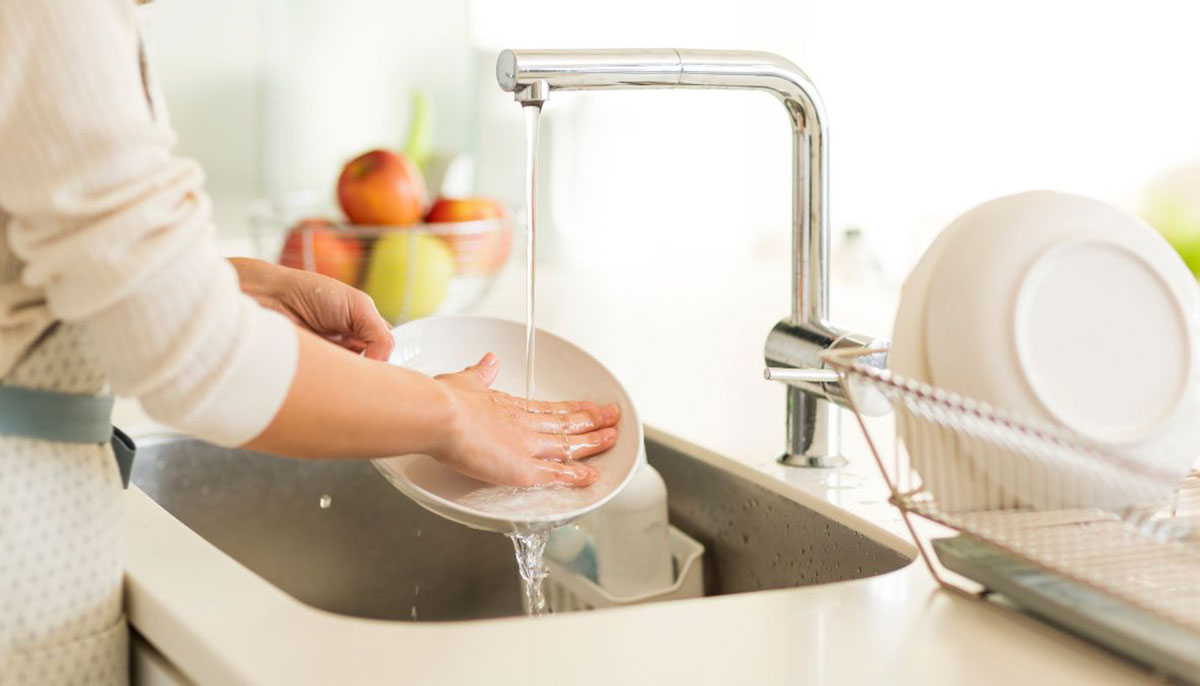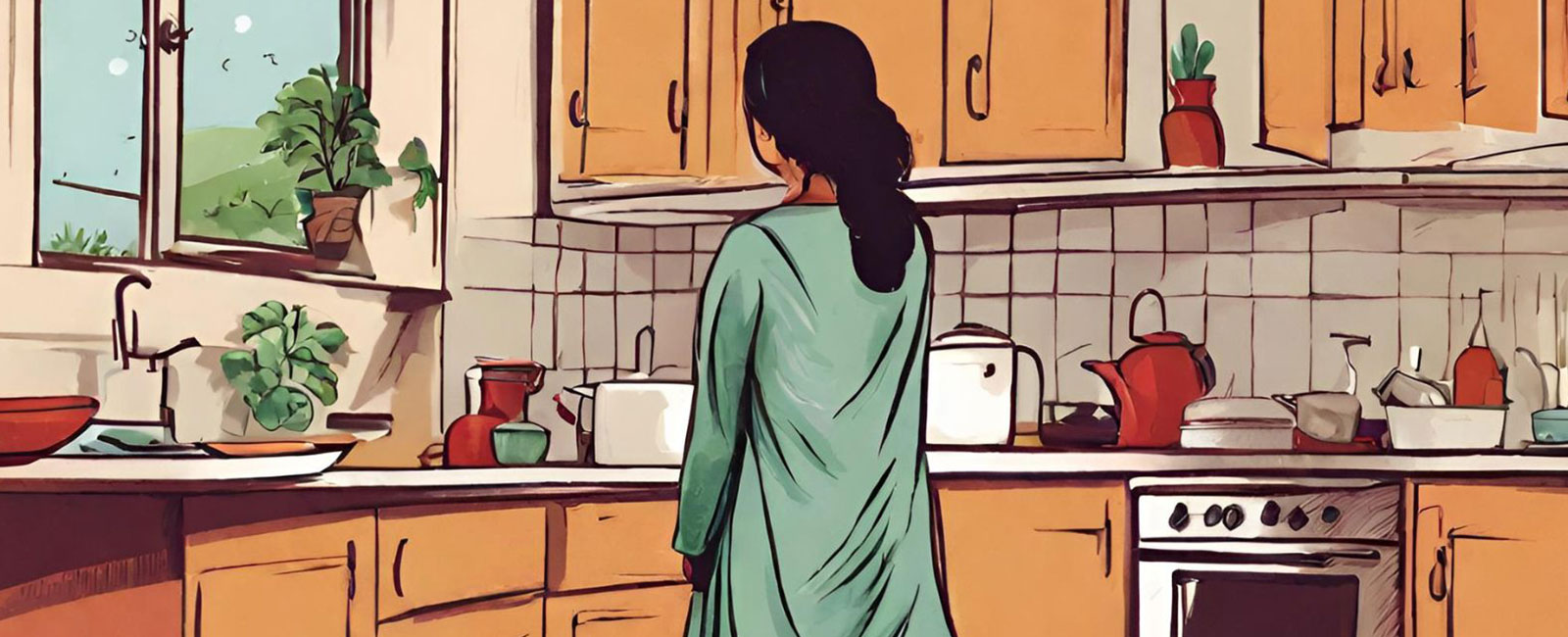'What do you do all day?' — The unvoiced realities of homemaking
The institution of homemaking isn’t at fault in itself but rather the unfair treatment of those bearing the responsibilities for years on end without due compensation for their efforts

In the cut-throat competitive world full of career-hungry aspirants there exists a silent yet significant demographic whose contributions often go loudly unsung — the homemakers — and amid the cacophony for professional success, they choose to perform labours of love for which they never get paid. Their sacrifices never make it to anyone's notice and sometimes their career dreams are reduced to only distant memories, which they may never be able to let go of.
Exactly what are the struggles of such homemakers? How do they cope with their being torn between two worlds? Do they regret the choices they made? To get all the answers here three women and their stories. We met with Sahar Asim, Sumaiya Jabeen, and Maria Imran and they offered an extremely rare glimpse into their unique homemaking truths.
Sahar Asim, who holds degrees in pharmacy and business administration, is a champion homemaker. Day in and day out, she works her body to the bone, running her household and raising a child instead of pursuing the dream of corporate success. Her ordeal mirrors that of myriad others, shedding light on the sacrifices and obstacles encountered by homemakers. Here's her story.
All of a sudden, I was a wife, a daughter-in-law, and eventually a mother — it was a big challenge to adapt to such a change. — Sahar Asim
Being the only daughter of her parents, Sahar Asim, 32, was spoon-fed by her mother on days when she was too engrossed in her studies to eat. Her father was like a genie at her command, as was her brother, fulfilling all her wishes.
The dynamics drastically shifted when she married her in-laws’ only son. “All of a sudden, I was a wife, a daughter-in-law, and eventually a mother — it was a big challenge to adapt to such a change,” Sahar told Geo.tv.
Her journey of transitioning to the demanding role of homemaker was accompanied by a myriad of challenges, often leaving her feeling alone in her struggles to sustain both her physical and mental health.
The institution of homemaking isn’t at fault in itself but rather the unfair treatment of those bearing the responsibilities for years on end without due compensation for their efforts. “Sometimes it hits me that I have no life outside of the kitchen, raising a kid, and managing my home,” admitted 28-year-old homemaker Sumaiya Jabeen.
I sometimes forget I also exist. — Maria
She further lamented that there is no way out of the monotony that sets in once one assumes the role of a homemaker. “I just try to be mentally strong enough to make peace with it.”
Maria Imran, a 38-year-old mother of three, also echoes similar sentiments, detailing the lack of time for herself. “Taking care of myself sometimes gets neglected amidst the various challenges,” she said and added, “I sometimes forget I also exist.”
Role strain
Dr Saman Zafar, an international behavioural therapist, highlighted the lack of recognition and appreciation for homemakers' contributions to the household, which can undermine their sense of self-worth.
"The lack of validation can make them feel invisible and insignificant," she noted.
“When a woman is raised with the constant reinforcement of the idea that her primary role is to take care of home and family, these expectations can limit her autonomy and personal fulfilment, leading to feelings of frustration and disillusionment.”
Dr Saman described the pressure that homemakers bear as "role strain". It occurs when a person is encumbered with several expectations and obligations at once, often leading to stress or burnout.
Home over career
A woman is expected to feel more fulfilled when she goes out to work because, at the end of the day, she returns home with the satisfaction of being fairly compensated for her respective labour. However, in our society, homemakers work round the clock with no words of appreciation, let alone a reward. This highlights their predicament of signing up for a lifetime of unacknowledged labour and unfulfilled aspirations.
Besides being a mother of two young kids, Sahar is also a qualified pharmacist and a business major. Hence, opting to be a homemaker over climbing up the career ladder didn’t come easy to her.

“At times, when I see my friends or [former classmates] being successful in life, I do feel like I am wasting my time, talent, and skills,” she lamented.
A homemaker’s entire day revolves around tending to the needs of others as she conveniently loses herself in the process. Unlike men, who work to sustain themselves and their families, women are confined to caregiving roles without recognition of their ambitions or desires.
No economic freedom
Financial dependence is another glaring factor. Maria had to quit her job when she got married and eventually had kids. Therefore, it especially stings her when she has to ask her husband for money.
“Although he never refuses, I still wish to be more independent so my self-respect wouldn’t get hurt while asking him for money to buy small things.”

Speaking with Geo.tv, Maria said that asking for money, unless she was financially independent, was 'very hard' on her self-esteem.
Dr Saman validated Maria’s sentiments, terming them “powerlessness or dependency,” as being financially dependent on a spouse or other family members may foster such feelings. “It can also affect their self-esteem and confidence,” she added.
Increasing social isolation
Growing up in a joint family system, Sumaiya found the transition to a nuclear family particularly challenging. She was forced to resort to solitary pursuits to maintain a semblance of sanity after a day filled with endless chores, fueling feelings of loneliness and isolation.
“[It] frequently hits me, and when it does, I feel like running far away.”
Sumaiya said she felt chained to her husband and kids at all times.
At times, when my husband or daughter gets sick, I have to pull the plug on my plans to take care of them.
“I have planned around 50 meetups with my friends in the four years since I got married,” she explained, noting how she and her friends had only managed to execute 10 such gatherings.
“At times, when my husband or daughter gets sick, I have to pull the plug on my plans to take care of them.”
Toll of under-appreciation on physical, mental health
According to an analysis published in the British Media Journal in 2021, unpaid domestic and care work is associated with a greater mental health burden and negative effects on quality of life.
“Being underappreciated has a significant effect on a homemaker’s mental health,” explained Dr Saman, further noting that it could lead to depression, low self-esteem, anxiety, frustration, resentment, and social withdrawal. “It also has a great impact on our physical health.”

The doctor also underscored the stigma attached to seeking help for mental health issues, prompting hesitation among homemakers to reach out for help due to the fear of judgment.
Time for self-care
Homemakers have a deluge of expectations associated with them, which often comes at the expense of themselves, as they continue to be taken for granted. “I have to go beyond my comfort to make time for myself,” shared Sahar. “But I make sure that the comfort of my husband and kids doesn’t suffer, even if mine does.”
Sumaiya relies on small pleasures to foster a sense of individuality after a long day of being a wife and mother, such as watching a drama series while her daughter is asleep. Freelancing also helps her stay connected with the outside world, thereby maintaining financial independence along with emotional well-being.
But Maria hardly gets time for herself amid endless household matters. “Despite that, I try to set aside those matters and do something that makes my heart and mind peaceful.”
Does spousal support make a difference?
Voicing your challenges as a homemaker could only bear fruition when it is acknowledged as a real job. Sumaiya believes having an empathetic spouse is paramount to avoiding spiralling thoughts. Sahar suggested that a man contributing to household chores shouldn’t only be limited to when the woman is working outside.
Practical support in household and childcare responsibilities also goes a long way in addressing feelings of being overwhelmed and exhausted in homemakers. — Dr Saman
“[They] should bear equal responsibilities for raising kids and household chores to ease the burden off homemakers,” she affirmed. As for Maria, she sheepishly admitted to often feeling unheard and misunderstood when trying to communicate her challenges to her partner.
Dr Saman outlined the importance of having someone to confide in when responsibilities begin taking a toll on the mental health of homemakers.
“Expressing concern about your challenges with your significant other plays a paramount role in reducing stress and feelings of isolation,” she said.

Practical support in household and childcare responsibilities also goes a long way in addressing feelings of being overwhelmed and exhausted in homemakers, according to Dr Saman.
Due appreciation
Sahar called for unbridled appreciation not only for the 24/7 service of homemakers but also for their decisions to prioritize their homes, especially when pursuing a career has become an escapable escape from solitude.
Tum saara din karti hi kya ho?
“If women are willingly prioritising home and kids over their own passions, that is something beyond [commendable],” she noted.
Some of the common phrases women who stay at home hear are: "Tum saara din karti hi kya ho? (What do you even do all day?)" or “Sirf yehi tau kaam hai ghar ka, tumhe konsa kamake laana hai (You are required to do housework only, at least you don’t have to go out and earn)”. Sumaiya stressed that being a mom was a 24/7 job. “There is no parallel for [motherhood].”
How to cope with challenges as a homemaker?
Dr Saman laid out a list of strategies homemakers can employ in an attempt to lighten the burden on themselves. Pursuing their interests, maintaining virtual contact with loved ones, and engaging in neighbourhood activities are some of the ways homemakers can mitigate the effects of social isolation, she explained.
“Individual or group therapy sessions can also help address feelings of loneliness and develop coping strategies,” added the expert.
However, Sumaiya, Sahar, and Maria unanimously agree that there is no escape from responsibilities, let alone a concept of ‘me time,’ at least until the children reach a certain age. Hence, they try to focus on the positive aspects of their lives, deeming it a blessing that they have a home they can look after, kids they can spoil, and a spouse they can rely on.
“I express gratitude for the blessings Allah bestowed upon me to restore the courage when things get too difficult,” admitted Maria. “I think of those who don't have these blessings,” Sumaiya added.
It is paramount to recognise the beautiful value homemakers add so abundantly to their families, communities, and society, giving voice to their unflagging efforts, though often taken for granted. Let's start by at least honouring their contributions to making the world a better place and celebrating their choices, sacrifices, and the patience of job.
Bazigah Murad is a staffer at Geo.tv
— Header and thumbnail image made using AI




